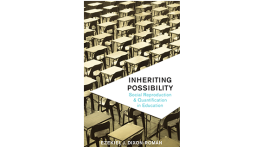Ezekiel Dixon-Román, "Measurement and the Racial Logics of Algorithmic Governance"
Thursday, November 17, 2022, 7 - 8:30pm

As part of the Fall 2022 IDS Lecture Series which are free and open to the public, Ezekiel Dixon-Román will focus on the relationship between blackness and measurement. More specifically, he is interested in developing an articulation of blackness that is situated in technopolitical systems, one that is inseparable from the logics of racial capitalism; and demonstrating via particular terms of Modernity how the colonial formation of the post-Enlightenment subject configures in the logic and practice of measurement, including in the axiomatics of the mathematics of quantification. He will trace this intervention through a few examples of statistical methods that are foundational to measurement, speaking to their broad reaching implications and the work they have long done and will continue to do in the biopolitics of disabling and debilitating racialized populations.
 Ezekiel Dixon-Román is an associate professor in the School of Social Policy & Practice at the University of Pennsylvania. His research seeks to make cultural and critical theoretical interventions toward rethinking and reconceptualizing the technologies and practices of quantification as mediums and agencies of systems of sociopolitical relations whereby race and other assemblages of difference are byproducts. He is the author of Inheriting Possibility: Social Reproduction & Quantification in Education (2017, University of Minnesota Press), recipient of the 2018 Outstanding Book Award from the American Educational Research Association. He also co-edited Thinking Comprehensively About Education: Spaces of Educative Possibility and Their Implications for Public Policy (2012, Routledge) as well as co-guest edited “Alternative Ontologies of Number: Rethinking the Quantitative in Computational Culture” (2016, Cultural Studies-Critical Methodologies), “The computational turn in education research: Critical and creative perspectives on the digital data deluge” (2017, Research in Education), “Control Societies @30: Technopolitical Forces and Ontologies of Difference” (2020, Social Text Online), and most recently “Dialogues on Recursive Colonialisms, Speculative Computation, and the Techno-Social” (2021, e-flux journal). He is currently working on a book project that examines the haunting formations of the transparent subject in algorithmic governance and the potential for transformative technopolitical systems.
Ezekiel Dixon-Román is an associate professor in the School of Social Policy & Practice at the University of Pennsylvania. His research seeks to make cultural and critical theoretical interventions toward rethinking and reconceptualizing the technologies and practices of quantification as mediums and agencies of systems of sociopolitical relations whereby race and other assemblages of difference are byproducts. He is the author of Inheriting Possibility: Social Reproduction & Quantification in Education (2017, University of Minnesota Press), recipient of the 2018 Outstanding Book Award from the American Educational Research Association. He also co-edited Thinking Comprehensively About Education: Spaces of Educative Possibility and Their Implications for Public Policy (2012, Routledge) as well as co-guest edited “Alternative Ontologies of Number: Rethinking the Quantitative in Computational Culture” (2016, Cultural Studies-Critical Methodologies), “The computational turn in education research: Critical and creative perspectives on the digital data deluge” (2017, Research in Education), “Control Societies @30: Technopolitical Forces and Ontologies of Difference” (2020, Social Text Online), and most recently “Dialogues on Recursive Colonialisms, Speculative Computation, and the Techno-Social” (2021, e-flux journal). He is currently working on a book project that examines the haunting formations of the transparent subject in algorithmic governance and the potential for transformative technopolitical systems.
Proof of complete COVID-19 vaccination and booster is required. The use of a face mask is encouraged while indoors.
The IDS public lecture series is part of the Robert Lehman Visiting Artist Program at The Cooper Union. We are grateful for major funding from the Robert Lehman Foundation. The IDS public lecture series is also made possible by generous support from the Open Society Foundations.
Located in the Frederick P. Rose Auditorium, at 41 Cooper Square (on Third Avenue between 6th and 7th Streets)




